Abstract
In recent decades, a digital transformation has been observed in the activities of every organization and human life, caused by the constant process of replacing human labor with the automation of production, operations and actions. Therefore, labor functions are gradually transformed, changing for many categories of workers. In European countries, the process of independent assessment of qualifications has been going on for several decades, which has now made it possible to accumulate substantial experience in the formation of National qualification systems. Establishment and development of an institution for the independent assessment of the professional qualifications of workers, aimed at improving the quality of work and improving labor productivity. This process is actively supported by the state, a regulatory framework is being formed, and tax deductions are provided. Personnel certification will allow the company management to optimize the composition and structure of the workforce, forming a truly cohesive team of professionals. The article discusses the best practices of European countries in developing an assessment system, as well as the existing system in Russia and its first results. In 2019, the Bank of Russia and the Council for Professional Qualifications of the Financial Market signed the Roadmap to ensure the transition to an independent assessment system for the qualifications of financial market specialists.
Keywords: Qualification assessmentqualification assessment centerdigital economypublic accreditationqualification frameprofessional standard
Introduction
A new qualification assessment system has been introduced in Russia and the process of introducing professional standards is actively underway. The current system of qualification assessment involves an independent assessment of the qualifications of employees for compliance with the requirements reflected in the professional standard.
The professional standard is a regulatory legal act approved by an order of the Ministry of Labor and Social Protection of Russia, and reflects the educational requirements and the necessary competencies, knowledge and skills to perform each generalized labor function.
Currently, Russia has developed about a thousand professional standards. However, their implementation in the practical activities of enterprises faced a number of problems of both organizational and regulatory nature. It is also difficult to carry out an independent assessment of qualifications in Russia.
Problem Statement
One of the main problems is the need to develop and approve the National Qualifications System as a basis for the development of professional standards, as well as the development of sectoral qualifications frameworks. Significant experience in creating national qualification assessment systems has already been gained abroad. Active work is under way to create a single European directory that will link the various national qualifications systems and thereby facilitate a closer link between them. In this way, a network of independent, but related and mutually understandable qualifications systems will be created. Using learning outcomes as a general guide, the framework will facilitate comparison and transfer of qualifications between countries, systems and institutions and, therefore, will be relevant to a wide range of users, both at European and national levels. Most European countries have decided to develop a national qualifications framework. Russia also had its own system of assignment and assessment of qualifications. It had both positive and negative sides that must be considered when introducing the new system.
Research Questions
More than 100 countries now through large-scale reforms, expansion of existing qualifications systems and the formation of new ones, have made the transition to national systems of qualification standards, using them as a political and economic tool.
Analyzing world experience we can say that today there is uneven development of standards, significant differences in the content and understanding of standards in different countries, the lack of a unified NQS, and the inability to quickly solve the problems of education and employment. Next, we consider in more detail the process of implementing the NQS in some European countries (Table
This article we will begin by studying the experience of England, as one of the developed and most stable countries. The introduction and development of the GNVQ began in 1981; it was the first attempt at the national scale to base professional qualification standards on the idea of competences or results that are not dependent on the input resources. Today it is the most famous model of the system of professional qualification standards in the world.
In 1983, an Action Plan 16+ was developed in Scotland. And in subsequent years, an increasing number of organizations engaged in the implementation of the GNVQ. The main objectives of the GNVQ implementation were ensuring the quality and availability of standards, improving the quality of the labor force through the development of qualifications, developing the skills needed by new industries, and the impact of the system on economic and social progress.
In the prospects for the implementation of the GNVQ until 2020, it should be noted that the UK is in the TOP 8 of the OECD countries in terms of productivity, employment and skills. In the period 1987-1988, the National Council for Professional Qualification Standards (NCPQ) was involved in the implementation of the NCPQ and the first GNVQ were assigned.
Since 1990, a new phase of development of the “new system of qualification standards” has been launched. As a result of ongoing technological changes, business restructuring, staff cuts in the United States in 1989 began the development of professional education standards. This work was caused by the need to improve the efficiency of the economy and ensure the growth of the welfare of the population in a situation of a changed organization of labor.
Developed "Skill Standards" are aimed at ensuring the mobility of workers in the labor market and the use of workers in the performance of related work. In 1990, the Commission on the “Labor Skills” was created, and in 1991 the National Center developed the “Skills for Workers” program. In addition, in the same period, a national coalition was formed to interact with the US Congress on the development of a regulatory framework. All this led to the publication in 1994 of the Law ‘Vysokiye umeniya, konkurentosposobnaya rabochaya sila’ (“High Skills, Competitive Labor”). The National Skills Standards Council (NSSC) has developed standards requirements in 15 sectors of the economy.
Purpose of the Study
Considering the global trends in the development of the National Qualifications System (NQS), you can highlight the main goals:
Globalization of social development and digitalization of the economy.
The need to monitor the effectiveness of the implementation of foreign systems for the independent assessment of qualifications. Study of best international practices.
Synchronization and updating of vocational education programs with approved professional standards and descriptions of qualifications by developing target indicators for monitoring the effectiveness of professional and public accreditation of programs and sets of assessment tools.
Integration of the parameters of the sectoral qualifications framework into a single digital platform that ensures the interrelated operation of the main information resources.
The purpose of this article is to show the positive experience of developing national qualification assessment systems, to characterize the features and problems of the development of this system in modern Russia and to offer solutions to these problems.
Research Methods
By the Decree of the President of the Russian Federation dated 04.16.2014 No. 249 the National Council under the President of the Russian Federation on Professional Qualifications was created, which coordinates work aimed at improving the quality of vocational education, as well as to bring federal state standards of vocational education in line with professional standards; on professional and public accreditation of educational programs of vocational education; on the formation of a system of independent assessment of professional qualifications ( President of the Russian Federation, 2014). In connection with the adoption on January 1, 2017 of the Federal Law № 238-FZ «About independent qualification assessment» the business community and the education sector need as soon as possible to begin working together to assess the professional competencies of economic and educational workers, create conditions for their inclusion in the continuing education system, strengthen the role of professional communities in the development of professional qualifications, develop procedures for confirming the applicant’s qualifications standard ( Federation Council of the Russian Federation, 2016). It should lead to an increase in the quality of vocational education and competitiveness in the labor market of persons who have undergone independent assessment of qualifications. By Decree of the President of the Russian Federation of 07.05.2018 № 204 «About the national goals and strategic objectives of the development of the Russian Federation for the period up to 2024» a roadmap for the development of the National Qualifications System ( President of the Russian Federation, 2018).
According to the National Agency for the Development of Qualifications, as of August 20, 2018, 22 СPQ, 275 qualification assessment centers (QAC) and 407 examination sites function in 62 regions of the Russian Federation. The distribution chart by regions of the centers is shown in Figure
During the period from 2014 to August 2018, about 18,000 people in various industries passed an independent assessment. Moreover, it should be noted that 16,500 people received certificates of qualification, and 1,473 people received a certificate of passing the exam. More detailed information on the results of the assessment of qualifications for the various qualifications is given in Table
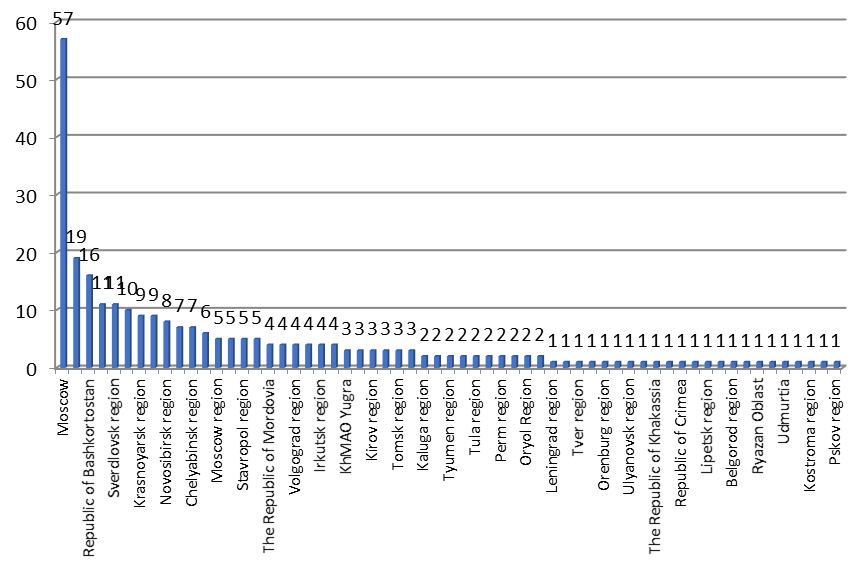
In accordance with the Main Directions of Development of the Financial Market of the Russian Federation for the period 2019-2021, the implementation of measures to improve the existing system of certification of financial market specialists contributed to the formation of an internal competitive labor market of financial professionals and the growth of confidence in financial organizations ( The Bank of Russia, 2019).
Federal Law of 03.07.2016 № 238-FZ has been established that from 01.07.2019, the previous procedure for the assessment of qualification, except as provided for, shall be terminated ( Federation Council of the Russian Federation, 2016). The certification system for financial market specialists will be transformed into a model for the admission of financial market specialists, which is based on business reputation requirements and independent qualification assessment conducted by qualification assessment centers in accordance with this law.
In 2019, the Bank of Russia and the Council on Professional Qualifications of the Financial Market signed the Roadmap to ensure the transition to the system of independent assessment of the qualifications of financial market specialists, which was presented on May 22, 2019 at the Russian Stock Market Forum.
The existing system of qualification certificates has been in operation for about 20 years. Admission to work in the financial market is carried out within the authority of the Bank of Russia for the accreditation of organizations involved in the assessment of qualifications (for example, educational institutions or specialized centers based on self-regulatory organizations, self-regulatory organizations). The presence of a certificate from a number of officials is a mandatory licensing requirement for professional companies.
The new roadmap was developed taking into account the main directions of development of the financial market of the Russian Federation for the period 2019-2021 and the Action Plan for the development of the national qualifications system in the Russian Federation for the period up to 2024 and is designed for the period until the end of 2021. The main purpose of the implementation of the Roadmap is to increase the effectiveness of professional training of financial market specialists, the introduction of best practices in the field of development and assessment of qualifications.
The Roadmap lists measures to ensure the quality of components and independent assessment processes, as well as strategic directions for the development of an independent assessment system for financial qualifications: development of tools for professional and public accreditation of educational programs, automation of independent assessment system processes and interaction of key participants in the system, ensuring international recognition of evidence on passing an independent assessment of the qualifications of a financial market specialist.
The general director of the financial market CPQ Diana Mashtakeeva in an interview explained that the new system involves the evaluation of applicants by independent centers of qualification assessment based on the results of the theoretical exam and the practical part ( Sarycheva, 2019). The certificate, which will replace the usual certificate, will have a level in accordance with the work experience and the planned list of positions for which the specialist applies. Confirmation of qualifications will be required every three years.
According to the assessment of the first deputy chairman of the Bank of Russia Sergey Shvetsov, the best practices that have been accumulated during the existence of the attestation system should be preserved during the formation of the certification procedure, and the main task is to harmoniously incorporate them into the new model for assessing the qualifications of market participants.
Currently, any organization that is not related to the educational sector, including credit institutions and financial companies, can receive center status.
To date, the center has already been established in the Association of Banks of Russia. In addition, as a sponsor of the center for professional standard "accountant" in the Volga Federal District, as well as a security examination center at the University named after N.I. Lobachevsky spoke Nizhniy Novgorod bank "Association", confirmed the general director of the Association for the development of professional qualifications and competencies in the Volga Federal District Maxim Chezhidov ( NIA Nizhniy Novgorod, 2019).
Nothing is known about the creation of the center by large banks. Documents on the status have also been submitted by the National Association of Stock Market Participants (NASMP), uniting mainly brokers and managers. Financial support of the centers will be carried out at the expense of funds raised by companies for the assessment of the qualifications of their employees. Thus, according to the published rates of the Council on professional qualifications of the financial market, the cost of passing the exam on the qualification "internal controller" will be 8.5 thousand rubles, and on the qualification "specialist in corporate risk management" - 43 thousand rubles.
We would like to note that one of the main tools for improving the work of qualifications and their infrastructure, ensuring the development of the National system of professional qualifications, is a clearer and deeper interaction between employers, employees and educational organizations.
Findings
The authors conducted a survey of business representatives in the territory of the Samara region. The survey was attended by 172 respondents. The respondents represented the whole range of enterprises of various sizes - from companies with a single permanent employee to companies with more than a thousand employees (Figure
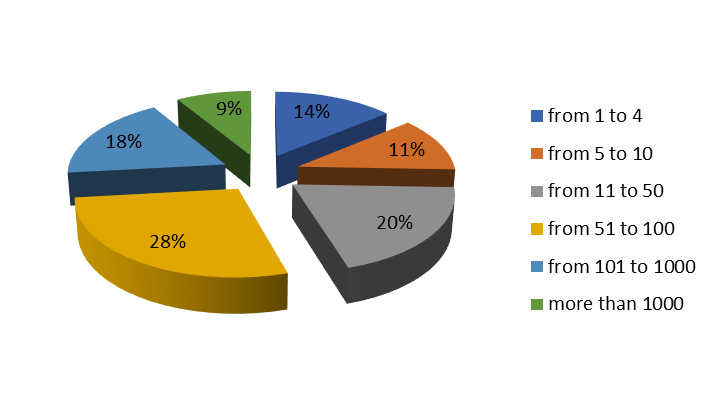
Most of the participants were Samara (117 respondents), Tolyatti (33 respondents), and Novokuybyshevsk (22 respondents). The survey results showed a fairly high relevance of educational programs for training and retraining of employees. The main majority of respondents (53%) replied that their enterprise “may in the next year or two have a need for new personnel or mass retraining of employees”. When planning activities for the development of vocational qualifications, it is necessary to take into account that less than half - 33% of respondents indicated that their company required training or retraining of employees on educational programs “to order”. Such programs in this case meant any programs for training or retraining of employees that are prepared directly by order of the enterprise and / or with the participation of employees, including special graduate programs in universities, short programs on specific topics to improve the skills of employees in certain areas, comprehensive retraining programs and other programs (Figure
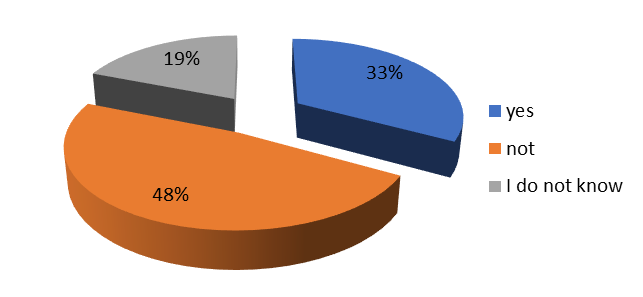
During the research, participants were asked about the most priority ways to improve staffing for their enterprises. When choosing these areas, employers most often name the least costly path - hiring new employees who already have work experience and the necessary qualifications (87% of all survey participants answered that way). At the same time, the priority - 59% - includes additional training for company employees in certain topics / areas (advanced training on short courses) (Figure
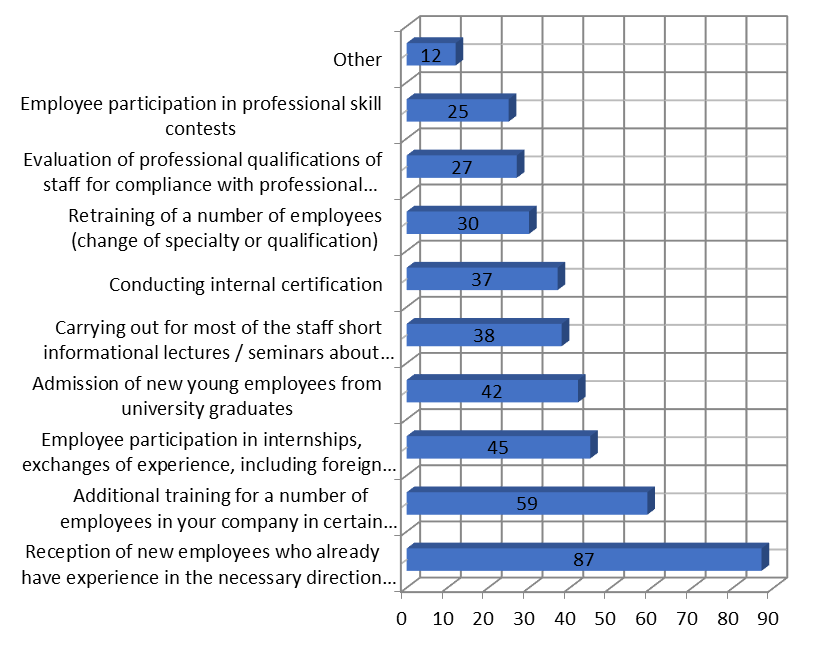
It is important to note that a little less than a third of the survey participants (27%), along with the admission of new employees and their training as a priority for improving staffing, called an assessment of the professional qualifications of employees for compliance with professional standards. Representatives of enterprises that noted this direction make up a group of companies that are more staffed (they more often than others noted that they would not need new personnel in the next year or two). Among them, two times more often than in the sample as a whole, there are large enterprises.
One of the important areas of formation of personnel potential is the reception of employees without work experience from among graduates of universities. Slightly less than half (42%) of respondents indicated this direction as a priority for the development of the personnel potential of their enterprise, and only 12% of enterprises, according to their representatives, do not take employees without work experience. As seen in Figure
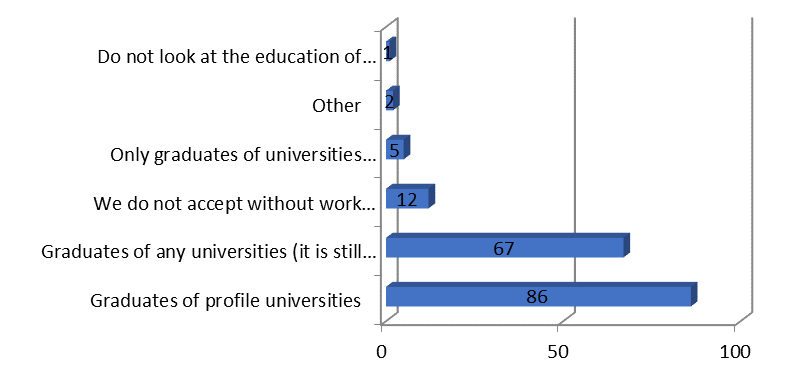
Among enterprises that have identified a set of university graduates as a priority of their personnel policy, there are more companies that take graduates only after programs prepared with the participation of the enterprises themselves (5%). he main reasons for the need of enterprises for new personnel or retraining of new personnel were survey participants, including upgrading new products and mastering new technologies. It should be noted that these two processes are not separated from each other by any respondent.
The most significant task of the survey was to ascertain the views of representatives of enterprises on popular and promising professions (specialties).
Before proceeding to the presentation of findings obtained in this area, it is necessary to fix the following provisions that are relevant for further analysis:
In the industry, including among the respondents, there is no single terminological base and conceptual apparatus. The concept of "profession" has a significant semantic differentiation among the various participants of the questionnaire.
Among the sought-after professions, professions that are directly related to the main economic activity of an enterprise (core specialties) do not always prevail. In one case, these are universal professions and general specialties. In the other, these are auxiliary, accompanying, supporting in relation to the profile production, for example, related to sales, market research, etc.
The question of promising professions caused a certain difficulty among survey participants. Despite the decoding in the questionnaire, both new (functionally updated) and the most popular old professions were called promising (new) professions.
Judging by the distribution of assessments of the demand for professions, respondents give an overestimated or situational assessment of the degree of demand.
Conclusion
Today, the necessary groundwork has been created for the transition to a new stage - the widespread introduction of a new qualifications system that meets the needs of the country's economic development for the medium and long term. This requires implementing a number of measures to ensure the necessary scale and pace of updating the qualifications system, primarily in the real sector of the economy, create mechanisms for phasing out obsolete qualifications, ensure the accelerated development of the infrastructure for independent assessment and recognition of qualifications, create mechanisms for the effective use of the new national qualifications system as a catalyst for the growth of human capital and increase the transparency of the labor market for Russian and foreign investment tori.
In our opinion, this will allow to achieve international recognition of the results of independent assessment of qualifications, to strengthen the international integration of the labor markets of Russia and foreign countries, especially for the Asian countries. At the same time, it is planned to pay special attention to the needs of modern professional and general competences of personnel from innovative industries, regional economic clusters, and large infrastructure projects.
Institutions of higher education in Russia that actively interact with the Council on Vocational Qualifications also have the right to rely on additional bonuses for this time-consuming and expensive procedure by increasing their competitiveness in the eyes of employers and applicants by increasing admission control figures. All of the above requires a number of operational decisions of a regulatory, organizational and infrastructural nature, both at the national and regional levels.
References
- Federation Council of the Russian Federation (2016). Federal law No. 238-FZ "On independent assessment of qualifications". Retrieved from: http://www.consultant.ru/document/cons_doc_LAW_200485/ Accessed: 02.12.2019. [in Rus.].
- National Qualifications Development Agency (2019). Independent assessment of qualifications: Current status, prospects Retrieved from: https://mintrud.admoblkaluga.ru/upload/minsocial/zan/nez_oc_kval/pol_inf/vebinar.pdf Accessed: 02.12.2019. [in Rus.].
- NIA Nizhniy Novgorod (2019). NNGU employees entered the commission for an independent assessment of the qualifications of banking specialists. Retrieved from: http://cv.iee.unn.ru/site/about/news/sotrudniki-nngu-voshli-v-sostav-komissii-po-nezavisimoj-otsenke-kvalifikatsii-bankovskikh-spetsialistov Accessed: 02.12.2019. [in Rus.].
- President of the Russian Federation (2014). Decree of the President of the Russian Federation dated 04.16.2014 No. 249 «About the National Council under the President of the Russian Federation on professional qualifications». Retrieved from: http://base.garant.ru/70637804/ Accessed: 02.12.2019. [in Rus.].
- President of the Russian Federation (2018). Decree of the President of the Russian Federation No. 204 of 07.05.2018 “About national goals and strategic objectives of development of the Russian Federation for the period till 2024”. Retrieved from: http://kremlin.ru/acts/bank/43027 Accessed: 02.12.2019. [in Rus.].
- Sarycheva, M. (2019). Qualification will replace certificate. Newspaper "Kommersant", 85, 8. Retrieved from: https://www.kommersant.ru/doc/3975426 Accessed: 02.12.2019. [in Rus.].
- The Bank of Russia (2019). The main directions of development of the financial market of the Russian Federation for the period 2019-2021. Retrieved from: https://cbr.ru/content/document/file/71220/main_directions.pdf Accessed: 02.12.2019. [in Rus.].
Copyright information

This work is licensed under a Creative Commons Attribution-NonCommercial-NoDerivatives 4.0 International License.
About this article
Publication Date
09 March 2020
Article Doi
eBook ISBN
978-1-80296-078-5
Publisher
European Publisher
Volume
79
Print ISBN (optional)
-
Edition Number
1st Edition
Pages
1-1576
Subjects
Business, business ethics, social responsibility, innovation, ethical issues, scientific developments, technological developments
Cite this article as:
Pecherskaya, E. P., Tarasova*, T. M., Krivtsov, A. I., & Frolova, I. V. (2020). The Effectiveness Monitoring Of System's Development For Independent Qualifications Assessment. In S. I. Ashmarina, & V. V. Mantulenko (Eds.), Global Challenges and Prospects of the Modern Economic Development, vol 79. European Proceedings of Social and Behavioural Sciences (pp. 1534-1545). European Publisher. https://doi.org/10.15405/epsbs.2020.03.220
